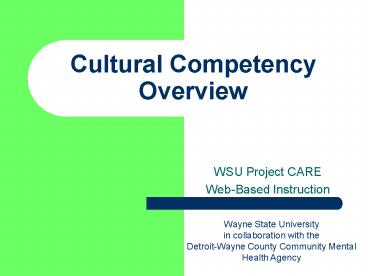Cultural Competency Overview - PowerPoint PPT Presentation
1 / 13
Title:
Cultural Competency Overview
Description:
Cultural Competency Overview WSU Project CARE Web-Based Instruction Wayne State University in collaboration with the ... – PowerPoint PPT presentation
Number of Views:612
Avg rating:3.0/5.0
Title: Cultural Competency Overview
1
Cultural Competency Overview
WSU Project CARE Web-Based Instruction
Wayne State University
in
collaboration with the
Detroit-Wayne County
Community Mental Health Agency
2
Training Goal
- The overall goal of this training is to review
terms and concepts related to cultural competency
and to explain the framework the Agency is
adopting related to cultural competency in
service delivery.
3
Behavioral Objectives
- At the end of this training, participants will be
able to - Define and explain terms and concepts related to
cultural competency - Identify the Agency needs related to cultural
competency based in analysis of the state
contract and the response to the state contract - Explain a framework for a series of training
initiatives addressing training needs related to
cultural competency
4
Terms Definitions
- Culture
- The integrated pattern of human behavior
that includes thought, communication, actions,
customs, beliefs, values and institutions of a
racial, ethnic, religious or social group.
Culture defines the preferred ways for meeting
needs. - Race
- The concept of race as used by the Census
Bureau reflects self-identification by people
according to the race or races with which they
most closely identify. These categories are
sociopolitical constructs and should not be
interpreted as being scientific or
anthropological in nature. - Ethnicity
- A large group of people classes according
to common racial, national, tribal, religious,
linguistic or cultural origin or background - Cultural Awareness
- Developing sensitivity and understanding of
another ethnic group. This usually involves
internal changes in terms of attitudes and
values.
5
Terms Definitions, contd.
- Cultural Sensitivity
- Knowing that cultural differences as well as
similarities exist, without assigning values,
i.e. better or worse, right or wrong, to those
cultural differences. - Cultural Diversity
- Refers to differences in race, ethnicity,
language nationality or religion among various
groups within a community. - Cultural Competency
- A set of congruent practice skills,
behaviors, attitudes and policies that come
together in a system, agency, or among
professionals and enables that system, agency or
those professionals to work effectively in
cross-cultural situations. - Accommodations
- To accommodate access and assure an individuals
full participation and receipt of maximum benefit
from the services being offered, the services
must be provided in a manner that recognizes and
takes into consideration the individuals
ethnicity, cultural differences, language
proficiency, communication, and physical
limitations.
6
Organizational Cultural Competency Framework
Agency
Contractors
Awareness
Competency
Sensitivity
Provider Agency
Practitioner
Cultural Destructiveness
Competency
Accommodation
Cultural Blindness
Ethnic Issues
Disability Culture
Gay/Lesbian
Children
Aging
7
Cultural Competence of a System
- Is a continual developmental process to provide
relevant services - Promotes services that are community based,
consumer driven and family oriented - Addresses access to mental health services,
cultural adaptation of services and equity in
service benefit - Is an active process to assure mental health
services, supports and treatment are effective
across cultures - Is integrated throughout the service delivery
system-needs assessment, information exchange,
service design and development, hiring practices,
staff development and supervision, outcome
measurement, policy and governance
8
Integration of Cultural Competency into an
Organizational System
- Utilize the Culturally and Linguistically
Appropriate Services Standards. (Office of
Minority Health, 2001) - Implement a written strategic plan to increase
organizational cultural competence - Know and understand the various cultural groups
present in the community served - Recruit and retain a diverse staff that are
representative of the community - Assure workforce includes readily accessible
bilingual/bicultural staff - Provide language assistance at all points of
contact - Provide translated vital service documents,
rights and grievance information
9
Applying Evidenced Practices Across Cultural
Groups
- Four As of Cultural Competency and
Evidence-Based Care - Accommodation/organizational readiness
- Implementing evidence-based care in organizations
that have already made accommodations to the
special needs of its cultural groups - Acceptability
- Assessment of whether or not model can work for
cultural groups of the organization (e.g. ACT
suitable to a Mung population?)
10
Applying Evidenced Practices Across Cultural
Groups, contd.
- Four As of Cultural Competency and
Evidence-Based Care, contd. - Adaptation
- Adapting the practice, if appropriate, to
cultural groups of the organization e.g., special
medication guidelines - Appraisal
- Appraising fidelity within the framework of
cultural adaptation - Appraising culture-specific outcomes
11
References
- Brach, Cindy (1996). Cultural competency and
managed care. Policy in Perspective, June 1996. - Cultural Competence Strategic Framework Task
Force (1996). New York State Cultural Competence
Standards (Draft Final Report). Albany, NY New
York State Office of Mental Health. - Lu, Francis (1996). Getting to cultural
competence guidelines and resources. Behavioral
Healthcare Tomorrow, April 1996. - Mason, J. L., et al. (1995). An Introduction to
Cultural Competence Principles and Elements, An
Annotated Bibliography. Portland, OR Portland
State University, Research and Training Center on
Family Support and Childrens Mental Health. - Roizner, Monica (1996). A Practical Guide for
the Assessment of Cultural Competence in
Childrens Mental Health Organizations. Boston,
MA Judge Baker Childrens Center. - Shockley, Mareasa (1997). The State-of-the-States
Responses to Cultural Competence and Diversity
in Child Mental Health (Final Draft). Washington,
D.C. Georgetown University Child Development
Center. - Siegel, Carole, et al., (2002). Cultural
Competency Methodological and Data Strategies to
Assess the Quality of Services in Mental Health
Systems of Care. NYSOMH, Nathan Kline Institute
for Psychiatric Research, 2002. - Stanley, Sue (2003). Cultural Competency Is it
Politically Correct? Newsletter, APPIC, November
2003.
12
Thank You for Your Participation
13
Final Steps
- To receive your certificate, please click here,
which will take you to a Word Document. - After completing the evaluation, please email the
word document to Tia Griffin tgriffin_at_med.wayne.e
du. or bring the completed evaluation to suite
750.

